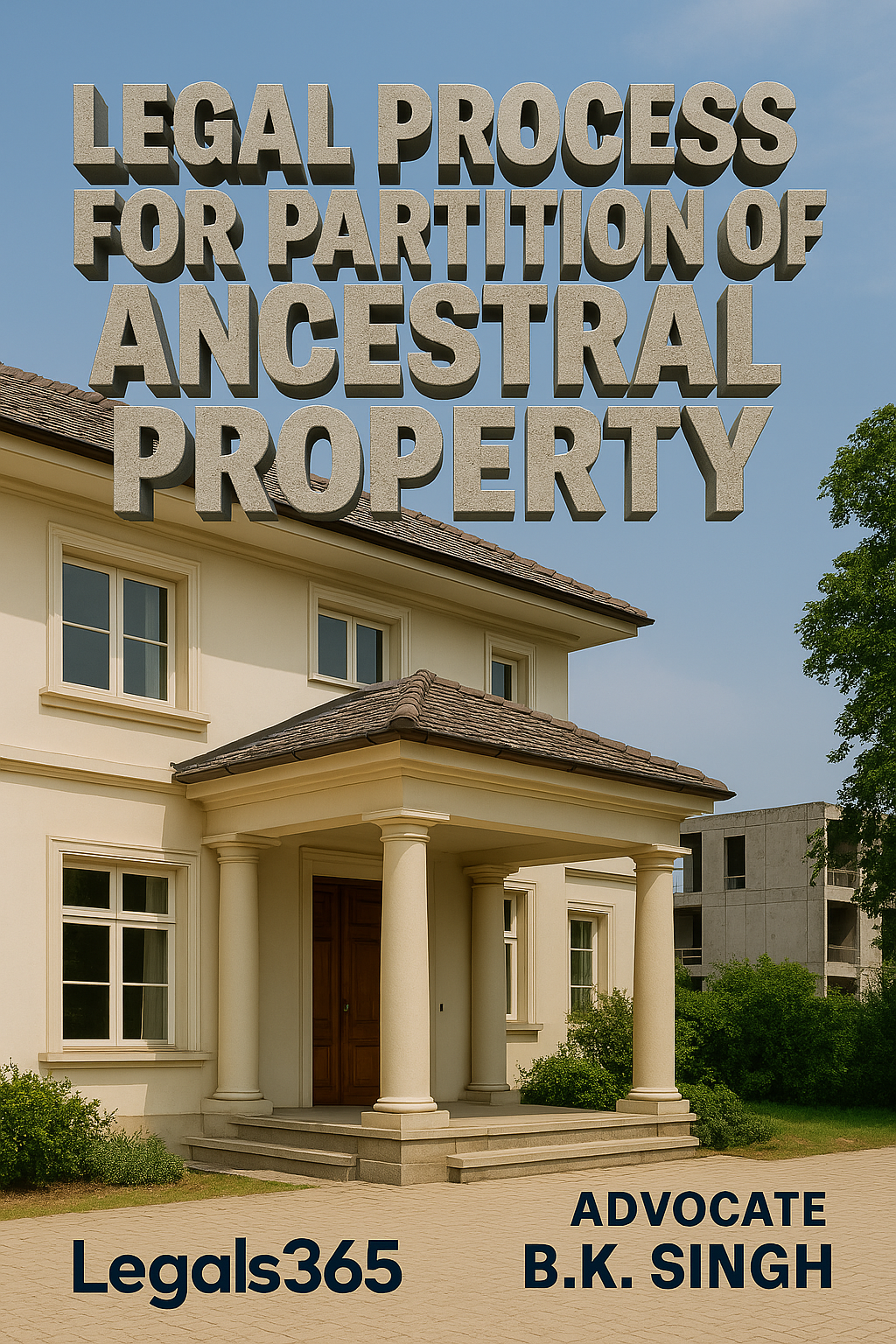
Legal Process for Partition of Ancestral Property
Introduction
Property disputes are one of the most common legal issues in India, especially when it comes to ancestral property. When multiple legal heirs claim ownership over inherited property, the situation can become emotionally and legally complicated. Many families reach a point where the only solution is a formal partition of ancestral property.
If you’re wondering how to legally divide such property among co-owners or heirs, this guide breaks down the legal process, essential laws, and the role of expert legal aid such as Legals365, led by Advocate B.K. Singh.
What is Ancestral Property?
Ancestral property refers to property inherited up to four generations of male lineage without any division. It typically passes undivided from the great-grandfather to the great-grandson.
Key Features:
- Must be inherited, not acquired.
- Cannot be sold without consent of all coparceners.
- Includes property under Hindu Undivided Family (HUF).
Legal Rights of Heirs
According to the Hindu Succession Act, 1956 (Amended 2005):
- Sons and daughters have equal rights.
- Women now have the status of coparceners.
- Legal heirs can demand partition at any time.
This law applies to Hindus, Buddhists, Jains, and Sikhs.
Types of Partition
1. Amicable Partition
When family members agree to divide the property through mutual consent, usually by a Family Settlement Deed or Partition Deed.
2. Judicial Partition
When one or more heirs file a partition suit in the civil court due to disagreement.
Legal Process for Partition Through Court
Step 1: Hire an Advocate
Engage an experienced property lawyer to review documents and draft your claim.
Step 2: File a Partition Suit
Your advocate will file a civil suit for partition under Section 9 of the CPC in the jurisdiction where the property is located.
Step 3: Submit Documents
Important documents include:
- Title deeds
- Death certificates of deceased ancestors
- Proof of relationship (legal heir certificate)
- Mutation records
Step 4: Court Proceedings
- Notices to all parties
- Evidence presentation
- Revenue records scrutiny
Step 5: Preliminary Decree
Court declares share of each co-owner.
Step 6: Final Decree and Possession
Property is physically divided (or sold and proceeds divided).
Common Challenges in Partition Cases
- Lack of clarity on ownership
- Missing or forged documents
- Denial of rights to female heirs
- Undivided joint family living in the property
- Disputes over valuation or possession
Alternative Dispute Resolution: Mediation
Mediation or arbitration is encouraged by courts to resolve family disputes.
Legals365 offers:
- Legal drafting of family settlements
- Notarization and registration services
- Legal counseling and court representation
Why Choose Legals365?
Led by Advocate B.K. Singh, Legals365 is a trusted legal partner for property disputes in India. We offer:
- 360-degree property litigation support
- Drafting and filing of partition suits
- In-court representation
- Title verification & documentation
- Legal aid for NRIs in ancestral disputes
Tips for Preventing Partition Disputes
- Maintain transparent family property records
- Execute family settlements early
- Register all documents
- Educate all heirs on their legal rights
Conclusion
Partitioning ancestral property is both a legal and emotional process. It involves understanding rights, filing the correct documents, and ensuring lawful division. While amicable partition is ideal, court-driven solutions offer relief when conflicts escalate.
Don’t delay if you are facing property disputes. Get expert help from Legals365 and Online Noida to file a partition suit or draft a settlement deed. Peaceful property division is possible—with the right legal backing.
Hashtags for Social Media
#AncestralPropertyIndia #PartitionOfProperty #LegalPartitionProcess #HinduSuccessionAct #Legals365 #PropertyDisputeIndia #FamilyPropertyLaw #AncestralRights #PartitionSuitIndia #LegalAdviceDelhi #AdvocateBKSingh #LegalHelpIndia #PropertyLawyerDelhi #LandDisputeResolution #NRILegalHelp #OnlineNoida
